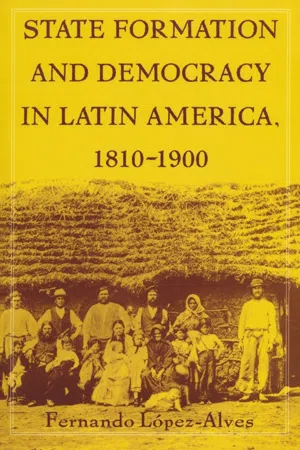
- English
- PDF
- Available on iOS & Android
eBook - PDF
State Formation and Democracy in Latin America, 1810-1900
About this book
Despite a shared colonial past, South American nations experienced different patterns of conflict in the nineteenth century. These differences led to the creation of a variety of states and regimes, from authoritarian military oligarchies to popular democracies. Using a rigorous logic of comparison, Fernando López-Alves explores the roots of state building in five countries and explains why the political systems of these early postindependent societies were prone to militarism, corporatism, or liberal democracy.
Breaking with the traditional economic analysis of South American development, López-Alves argues that civil-military relations lay at the core of state building. By comparing three countries in particular—Uruguay, Colombia, and Argentina—during an intense phase of state and regime formation, he shows how war and the collective action of the rural poor contributed to the construction of central armies, the rise of new social classes, and the emergence of civilian organizations. He also examines characteristics unique to each country's war-formed culture and discusses how coalitions were built during this period. Examples from Paraguay and Venezuela and references to state formation in Europe, the United States, Asia, and the Middle East add to the complexity and richness of the study's comparative analysis.
Drawing on a vast bibliography of both primary and secondary sources, López-Alves goes beyond providing insights into the particular development of Latin American countries and introduces a comprehensive theory of state formation applicable to other regions. This book will interest Latin Americanists, historians, political scientists, and sociologists studying state formation.
Breaking with the traditional economic analysis of South American development, López-Alves argues that civil-military relations lay at the core of state building. By comparing three countries in particular—Uruguay, Colombia, and Argentina—during an intense phase of state and regime formation, he shows how war and the collective action of the rural poor contributed to the construction of central armies, the rise of new social classes, and the emergence of civilian organizations. He also examines characteristics unique to each country's war-formed culture and discusses how coalitions were built during this period. Examples from Paraguay and Venezuela and references to state formation in Europe, the United States, Asia, and the Middle East add to the complexity and richness of the study's comparative analysis.
Drawing on a vast bibliography of both primary and secondary sources, López-Alves goes beyond providing insights into the particular development of Latin American countries and introduces a comprehensive theory of state formation applicable to other regions. This book will interest Latin Americanists, historians, political scientists, and sociologists studying state formation.
Frequently asked questions
Yes, you can cancel anytime from the Subscription tab in your account settings on the Perlego website. Your subscription will stay active until the end of your current billing period. Learn how to cancel your subscription.
No, books cannot be downloaded as external files, such as PDFs, for use outside of Perlego. However, you can download books within the Perlego app for offline reading on mobile or tablet. Learn more here.
Perlego offers two plans: Essential and Complete
- Essential is ideal for learners and professionals who enjoy exploring a wide range of subjects. Access the Essential Library with 800,000+ trusted titles and best-sellers across business, personal growth, and the humanities. Includes unlimited reading time and Standard Read Aloud voice.
- Complete: Perfect for advanced learners and researchers needing full, unrestricted access. Unlock 1.4M+ books across hundreds of subjects, including academic and specialized titles. The Complete Plan also includes advanced features like Premium Read Aloud and Research Assistant.
We are an online textbook subscription service, where you can get access to an entire online library for less than the price of a single book per month. With over 1 million books across 1000+ topics, we’ve got you covered! Learn more here.
Look out for the read-aloud symbol on your next book to see if you can listen to it. The read-aloud tool reads text aloud for you, highlighting the text as it is being read. You can pause it, speed it up and slow it down. Learn more here.
Yes! You can use the Perlego app on both iOS or Android devices to read anytime, anywhere — even offline. Perfect for commutes or when you’re on the go.
Please note we cannot support devices running on iOS 13 and Android 7 or earlier. Learn more about using the app.
Please note we cannot support devices running on iOS 13 and Android 7 or earlier. Learn more about using the app.
Yes, you can access State Formation and Democracy in Latin America, 1810-1900 by Fernando Lopez-Alves in PDF and/or ePUB format, as well as other popular books in Politics & International Relations & Latin American & Caribbean History. We have over one million books available in our catalogue for you to explore.
Information
Publisher
Duke University Press BooksYear
2000Print ISBN
9780822324744, 9780822324508eBook ISBN
9780822399636Table of contents
- Contents
- Illustrations
- Tables
- Acknowledgments
- Introduction
- 1. The Argument: War, Polities, and the Rural Poor
- 2. Gauchos, Ranchers, and State Autonomy in Uruguay, 1811-1890
- 3. A Weak Army and Restrictive Democracy: Colombia, 1810-1886
- 4. A Stronger State and Urban Military: Argentina, 1810-1890
- 5. Two Alternative Paths of State Making: Venezuela and Paraguay
- Conclusions
- Notes
- References
- Index